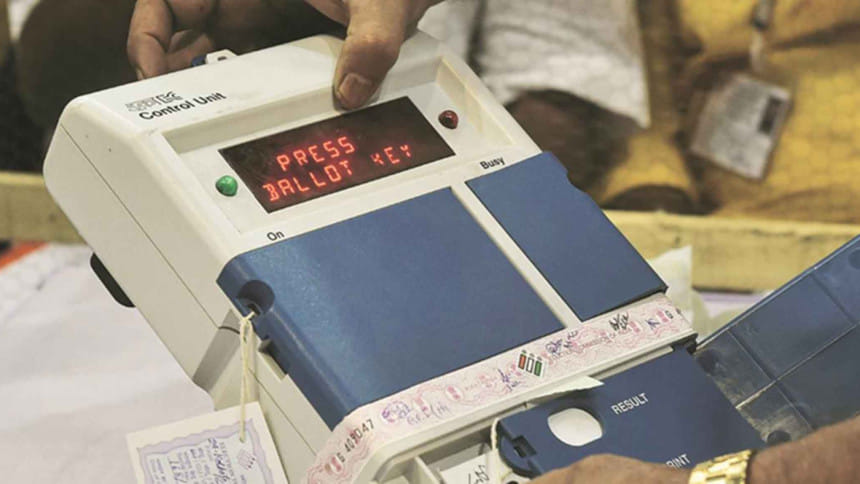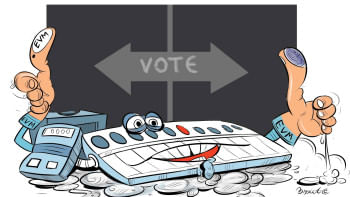Who is afraid of EVMs and why?

Bangladesh's Chief Election Commissioner (CEC) Kazi Habibul Awal, in a recent interview with The Daily Star, said there was no scope for showing muscle power during voting if the electronic voting machines (EVMs) are used during polls. His remarks have more than anything reignited the debate over the reliability of EVMs in reflecting people's mandate. However, the main opposition party, the BNP, remains as sceptical about EVMs as ever.
It is pertinent to turn to India, Bangladesh's closest neighbour and the world's largest democracy, to find out how the Indian Election Commission manages EVMs during state assembly and parliamentary elections, and sustains the sanctity of the adult franchise.
It was in 1982-83 that the Indian Election Commission first used EVMs on an experimental basis in 50 polling stations of Parur assembly constituency in the southern state of Kerala. The Supreme Court had, however, suspended their use in 1984, on the grounds that their usage could not be allowed till the Representation of the People Act, 1951 was amended. It took another four years to amend the law, enabling the use of EVMs with effect from March 15, 1989. Since the year 2000, EVMs have been used in all elections across India – four Lok Sabha and 122 state legislative assembly polls.
But it hasn't been a smooth journey all the way for EVMs in India, as opposition from various quarters persists till today, with some parties continuing to harbour doubts about the possibility of tampering with the machines and how they are transported from booths to strongrooms of the Election Commission, and then to counting centres. In 2018, the apex court rejected a petition seeking to restore ballot papers. Despite that, political parties that have lost the electoral battles have gone public from time to time, airing their suspicion of EVMs and preference for paper ballots.
Politicians have accused parties of tampering with the machines, hacking them or stealing them to influence poll results. But none of them have been proven. Those complaining about EVMs are caught in self-contradiction. For instance, in 2017, after the Aam Aadmi Party's defeat in Punjab assembly elections, the party had demanded a probe into the alleged malfunctioning of EVMs, and claimed EVMs can be hacked in 90 seconds. AAP legislator Saurabh Bhardwaj even sought to demonstrate in a public session how EVMs can be tampered with. The Election Commission invited all parties to prove their claims, but no political party took up the gauntlet. Five years down the line, the AAP won the Punjab assembly polls earlier this year and assumed power in the state for the first time, and it did not complain about EVMs.
In early 2017, Mayawati's Bahujan Samaj Party was decimated in the Uttar Pradesh assembly polls, prompting her to allege that the BJP had tampered with the EVMs. Mayawati was supported by her rivals, the Samajwadi Party and Congress, but the Election Commission rejected the charges.
A series of setbacks in both national and state-level polls prompted India's main opposition party, the Congress, to discuss the use of EVMs and its possible tampering at its brainstorming session in Udaipur city in May this year. Senior party leader Prithviraj Chavan wanted the party to pass a resolution saying India would return to paper ballots if the Congress returned to power. There were many leaders at the meeting who opposed the use of EVMs.
The Congress needs to be reminded of two important things: i) That the party won several elections, including the two consecutive general elections in 2004 and 2009, with votes cast using EVMs; and ii) Chavan's suggestion that Congress make a promise to switch to paper ballots if the party is voted back to power can happen only through the existing system of general elections using EVMs.
Even at the height of the BJP's supremacy in electoral battles in most parts of India in 2018, Congress won assembly elections in the heartland states of Rajasthan, Chhattisgarh and Madhya Pradesh, defeating the saffron party in votes cast through EVMs. So, is it fair for certain parties to blame the EVMs?
Some parties have often complained about instances of EVMs being found in private vehicles of politicians, but they have been nothing more than stray cases, and certainly not at a scale to vitiate the polling in its entirety. The Indian Election Commission has put in place elaborate measures regarding the safety of EVMs during transportation and against loss or theft. Measures include tracking software, installing GPS devices in vehicles carrying EVMs, and mandatory video recording of the entire process.
The parties also wanted the Election Committee to introduce Voter Verifiable Paper Audit Trail (VVPAT) attached to EVMs for further transparency and verifiability in the poll process. The poll body has done that too.
Pallab Bhattacharya is a special correspondent for The Daily Star. He writes from New Delhi, India

 For all latest news, follow The Daily Star's Google News channel.
For all latest news, follow The Daily Star's Google News channel. 









Comments